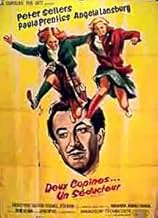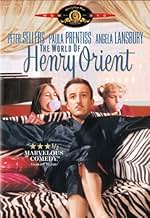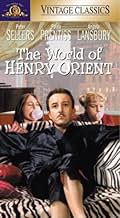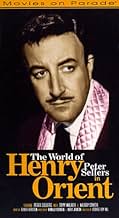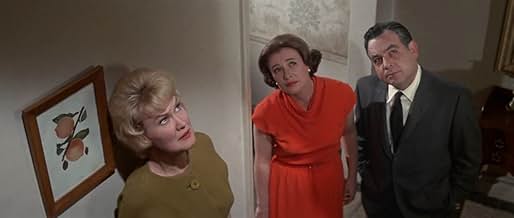Una traviesa y aventurera chica de catorce años y su mejor amiga comienzan a seguir a un excéntrico concertista de piano por la ciudad de Nueva York después de que ella se enamore de él.Una traviesa y aventurera chica de catorce años y su mejor amiga comienzan a seguir a un excéntrico concertista de piano por la ciudad de Nueva York después de que ella se enamore de él.Una traviesa y aventurera chica de catorce años y su mejor amiga comienzan a seguir a un excéntrico concertista de piano por la ciudad de Nueva York después de que ella se enamore de él.
- Dirección
- Guionistas
- Elenco
- Premios
- 1 premio ganado y 3 nominaciones en total
- Doorman
- (as Jerry Jerrett)
Opiniones destacadas
as an adult. The story of two young girls who sweetly stalk a
concert pianist, played with insane panache by Peter Sellars, is
one of the nicest coming-of-age movies of that era. Set in New
York, her is a surprisingly sophisticated and gentle comedy you'll
enjoy over and over again.
Sellars's clueless, womanizing virtuoso never strikes a false
comic note. He's wildly inventive, never more so than in his
scenes with the gorgeous Paula Prentiss as the way-too-nervous
object of his lust. Playing a married woman who is flattered by his
attentions, Prentiss manages to look glamorous and on the verse
of a nervous breakdown all at once. Why this spectacularly gifted
comic actress didn't make it to the top is a mystery to me.
Angela Lansbury's socialite bitch of a mother is another one of her
classic nasty lady roles. Nobody can look down her nose with the
authority of Lansbury. Yes she got found acceptance and respect
on Broadway and on television, but she was a first-rate character
actress on screen too.
Tom Bosley is sympathetic as Tippy Walker's father and Phyllis
Thaxter exudes motherly warmth as Mary Spaeth's divorced Mom.
The Walker and Spaeth should have had futures as screen
actors. Alas, it was not to be. But they are delightful as the young
girls on the verse of womanhood, with a terrific crush on an
undeserving idol.
Nora and Nunnelly Johnson's script (he of course, a Hollywood
legend) wrote a sharp, funny and observant screenplay that is
respectful of teenagers and the adults. George Roy Hill is not a
great director, but when given good material, he rises to the
occasion as he does here. A real gem.
Peter Sellers is actually something of a secondary in this one as the title role, but his portrayal of Henry Orient is so ludicrous and wonderful that he steals the show every time he's on screen. He was really something. Sellers plays it very large here, as a pretentious, NYC-based, avant-garde pianist of meagre talent--a charlatan, egoist, and ersatz Lothario who cultivates a faux-Euro accent but slides back into his 'native' Brooklyn (Sellers is probably the greatest accent-mimic ever) jargon every time he gets rattled, who has Paderewski hair that he continuously primps, and who entices women who've actually fallen for his schtick by hurling continuous salvos of romance-novel drivel at them until they (hopefully) relent.
Oddly, although it is made plain and obvious in the dialogue that Henry Orient is more or less a hack, and although Sellers plays his usual skillful physical shenanigans, I found that the pianist on the soundtrack played the piano quite well, despite the ridiculous material. There's a hilarious, gushing theme that is edited into almost every scene that Henry is in. His mannerisms during the piano concerto and the ostentatious buffoonery from scene to scene show Sellers in his element, and he never misses the chance to exploit the full range of available comedic ingredients in any moment to the utmost. Every time I watch him cross his arms to play two notes four octaves apart at the end of the concerto, and he does the little wiggle of the finger as if he's depressing the string on a violin to get vibrato out of it, I let out a belly laugh. I never get tired of that.
The two protagonists (or rather, Sellers's perceived antagonists) are played with mesmerising enthusiasm by the two adolescent leads. Tippy Walker is particularly radiant in this movie as the talented, attention-starved, sensitive, hyperkinetic Val, who develops a crush on Henry. Her pixie features, infectious retainer-filled smile, and wide-eyed, bubblegummy girlishness shine on, and share honors with Sellers for scene-steal appeal. She plays off the hurt, pouty ingenue angle beautifully too. Her counterpart, Merrie Spaeth, is no slouch either, although she had the disadvantage here of having the 'straight man' role. No matter! They don't compete for space at all (the scene-stealing qualities of Ms Walker notwithstanding),and they get equal attention and equally precocious dialogue, with the simpatico theme being so stressed as to tell us purposely that they are equal partners through and through.
Ultimately the film leaves me feeling bittersweet, partially through nostalgia--Hill's 1963 NYC is beautiful--but also because the movie has that theme of fleeting innocence in the face of oncoming adolescent desire. George Roy Hill's great movies have a sparkle to them, and this qualifies as one of the quieter greats. In any case, as time buries this one, those halcyon days of youth go with it, but the legacies of Sellers and Hill should mark it for at least cult-status immortality, which by proxy should give the girls their deserved legacy too.
The movie really belongs to the two girls with a crush on the Sellers character, Henry Orient, a schlocky avant-garde pianist. Gil (Merrie Spaeth) has a the big crush on Orient and her friend Val (Tippy Walker) is her cohort in the 2 member fan club. Their relationship seems so natural you forget they are acting. Neither girl had a long career in movies (few child actors do) and it's nice to see child actors carry a movie so effortlessly. So many times kid actors can only play cute and you are quickly reminded that real kids never act that way. I suspect George Roy Hill deserves some credit for their performances - I know he got good performances from Diane Lane and Thelonious Bernard in A Little Romance. Their performance doesn't rank up there with Tatum O'Neal in Paper Moon but are still very good. Considering it was the first movie for each of them, their performances are even more remarkable.
After the girls the performance by Paula Prentiss stands out. Playing a much more glamorous role than she had previously (think Tuggle in Where The Boys Are) she is funny and sexy as the married object of Seller's affections. A pleasant surprise and an indication that she should have been a bigger star than she was. Why couldn't she have had more roles like this?
Tom Bosley also plays a warm father to Val - a more sentimental version of his role as Mr C on Happy Days. Angela Lansbury practically reprises her role from The Manchurian Candidate as the worst mother she could be.
As for Sellers, his accent shifts continually. Maybe he thought he was playing numerous characters as he did in Dr Strangelove and never realized when he changed costume he was still Henry Orient. As much as I love and respect Sellers, I could see other actors in the role without hurting the movie.
If you want to see teenagers do a good job of acting like teenagers (albeit in 1964 and having a crush on a concert pianist instead of the Beatles) this is a good flick. Plus New York looks really good - you almost believe it's safe for teenage girls to wander the city late at night.
As a side note, I was surprised to discover that Merrie Spaeth was the founder of Spaeth Communications. She may not have had a long career as an actress but she sure became a success as an adult.
Sellers has the title role as Henry Orient, a pianist more interested in practicing his lines than his scales, but the film's focus is on a lonely young Manhattanite named Gil (Merrie Spaeth) and her new pal Val (Elizabeth "Tippy" Walker), two adolescents who decide to make Val's crush on Orient into the secret center of an adventure-filled friendship.
"Henry Orient" is a film of two parts co-existing uneasily at times. Val and Gil's bond occupies the realm of real life, with Walker and Spaeth giving spot-on performances that seem spontaneous and alive to every moment. The best scene in the movie by far, very much in line with the "Can't Buy Me Love" sequence in the same year's "Hard Day's Night," shows the pair running along a city block, "splitzing" over fire hydrants and tryke-riding boys, their eyes alight with joy as they literally rise over their city surroundings. It's a captivating exercise in what scholars would call "pure cinema." If the rest of the film doesn't rise to that level, it never entirely disappoints, either.
Sellers' sequences are weaker. He's actually quite enjoyable to watch, doing one of his best voice performances as a Brooklynite who affects a French-Italian accent to charm the ladies (listen carefully and you will hear his Brooklyn undertone throughout) but he and Paula Prentiss as the married object of his desires seem to be in a completely different movie, playing a broad farce at odds with the real, sometimes gut-wrenching tone of the rest of the film.
This could be a bigger problem but for Elmer Bernstein's lilting yet driving score, featuring one of the most arresting themes I've heard in film, which seems to carry Val and Gil from one delirious moment to the next with complete abandon while allowing room for darker, contemplative passages. Director George Roy Hill had a gift for employing music at the right moment (see "The Sting"), and the score of "Henry Orient" is a secret strength as it skates over the thinner plot elements.
More obviously a strength is the script by Nora and Nunnelly Johnson, which really captures a sense of how young people talk, goofily, quickly and all-at-once, skipping over the stuff that doesn't matter, like when Val and Gil first meet at their ritzy school. Val asks Gil if she likes being there.
Gil tries to be diplomatic: "They say it's the finest girls' school in the country." "I don't, either," says Val.
Or the priceless exchange they have when taking out a cigarette butt they cadged off of Orient's table during a midday stalk. "No filter!" "He's not scared." One wishes the film found more to draw Orient and his youthful admirers together, though the detour into the state of Val's parental relations has merits of its own, especially with Angela Lansbury doing another of her classic nasty-Mommy turns.
While it didn't set the world on fire in 1964 and, like its young stars, slipped off the radar screen too soon after its premiere, "Henry Orient" remains an engaging glimpse at American youth post-Salinger but pre-Beatles. Sidewalk placards still advertise color TV, while a rich girl's idea of rebellious fashion sense involves wearing a plaid skirt with a mink coat. Trends come and go, but feelings of the kind celebrated in "The World Of Henry Orient" live on.
What makes this film so appealing is the way it portrays adolescent awakening as a completely unsordid and sweet experience. Yes, there is pathos, when the two discover how adults have turned their world into Henry Orient's world.
Although the cast is sterling all around, Tom Bosley is a standout as father to one of the girls, who helps put things to rights.
If the Kennedy assassination and Vietnam are cultural watersheds, then this film is a refreshing antidote; it gives the lie to the glib put-downs of the era by the current generation.
¿Sabías que…?
- TriviaThe character of Henry Orient was inspired by real-life concert pianist Oscar Levant. Nora Johnson, who wrote the novel on which the movie was based (and co-wrote the screenplay with her father, Nunnally Johnson), said that she and a friend had a crush on Levant when they were schoolgirls.
- ErroresWhen Mrs. Gilbert pours Mr. Boyd a drink at her home, the "scotch" foams slightly. Real booze doesn't do that; its ubiquitous stand-in, cold tea, does.
- Citas
[Val induces a fantasy about Gil's divorced parents]
Val Boyd: Think your Dad will ever come back?
Marian Gilbert: Why can he? He's married and has a couple of kids.
Val Boyd: But how do you know he's happy?
Marian Gilbert: He's crazy about her.
Val Boyd: I know, but just suppose he suddenly realized his second marriage was a tragic mistake. His eyes are opened at last, and he knows now that your mother is the only woman he's ever loved in his whole life.
Marian Gilbert: I don't think there's much chance of that.
Val Boyd: So there's nothing to do but tell her the truth... the scond wife I mean. He's simply got to go back to the only woman he's loved in his whole life. Good-bye, second wife.
Marian Gilbert: You think that's really possible?
Val Boyd: Well, he's got no other choice. He can't go living a lie, can he? He's got to go back to his one true love.
Marian Gilbert: Maybe, during Christmas.
Val Boyd: Chirstmas Eve maybe.
Marian Gilbert: About 6:00.
Val Boyd: You and your mother are all alone trimming the tree, when suddenly the doorbell rings.
Marian Gilbert: I'd be the one to go and answer it.
Val Boyd: But you'd be wondering 'who on earth it could be,' because you weren't expectign anyone. He'd open the door, and he'd be standig there simply loaded with presents. And before you could say anything, he'd say, 'Shhhh,' because he wants to surprise your mother. At first, he'd give you a big hugh, just as tight as he could.
Marian Gilbert: And them Mom would come down wondering who it was, beause she'd be wondering why she didn't hear anybody say anything.
Val Boyd: And for a long time, they'd just stand there and stare at each other not saying anything.
Marian Gilbert: They wouldn't have to.
Val Boyd: [sighing mid-sentence] And then he'd take her in his arms, and rain kisses on her upturned face, and they'd just... love each other to death right there at the front door.
- Créditos curiososintroducing MERRIE SPAETH as "Gil" TIPPY WALKER as "Val"
- ConexionesFeatured in Hollywood: The Gift of Laughter (1982)
- Bandas sonorasHenry Orient Concerto
Music by Ken Lauber (as Kenneth Lauber)
Conducted and orchestrated by Ken Lauber (uncredited)
Selecciones populares
- How long is The World of Henry Orient?Con tecnología de Alexa
Detalles
- Fecha de lanzamiento
- País de origen
- Idiomas
- También se conoce como
- The World of Henry Orient
- Locaciones de filmación
- The Brearly School, 610 E. 83rd Street, Nueva York, Nueva York, Estados Unidos(School bus drop-off at end of opening credits)
- Productora
- Ver más créditos de la compañía en IMDbPro
- Tiempo de ejecución1 hora 46 minutos
- Color
- Relación de aspecto
- 2.35 : 1
Contribuir a esta página




